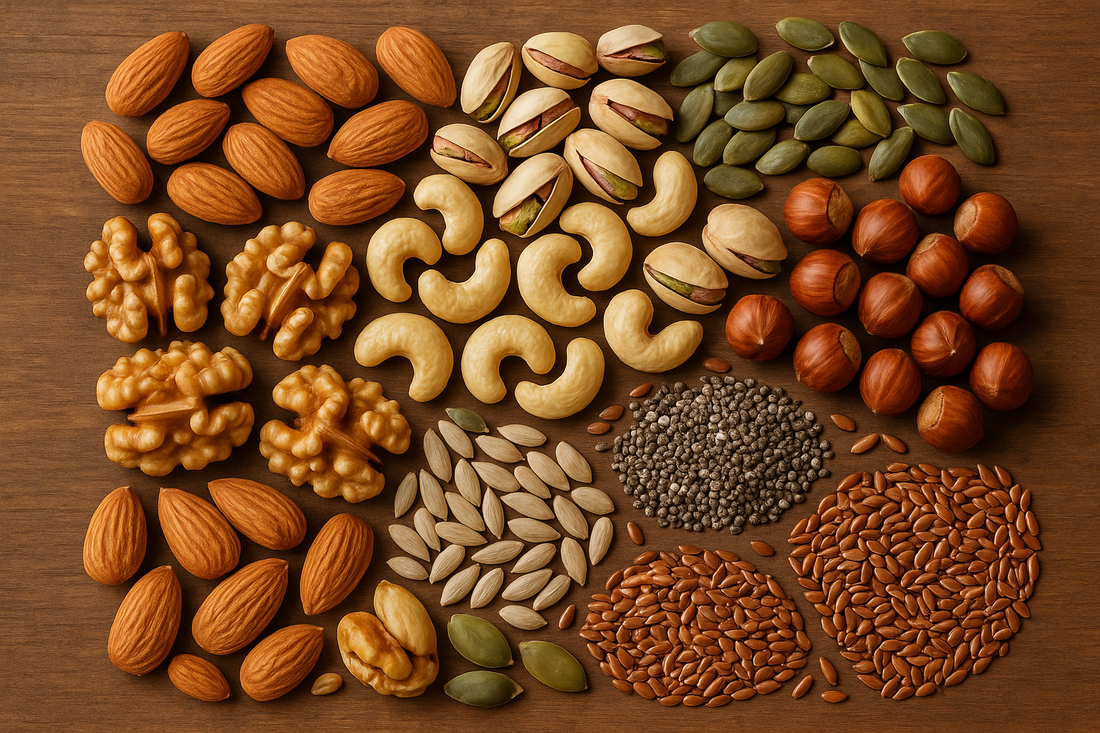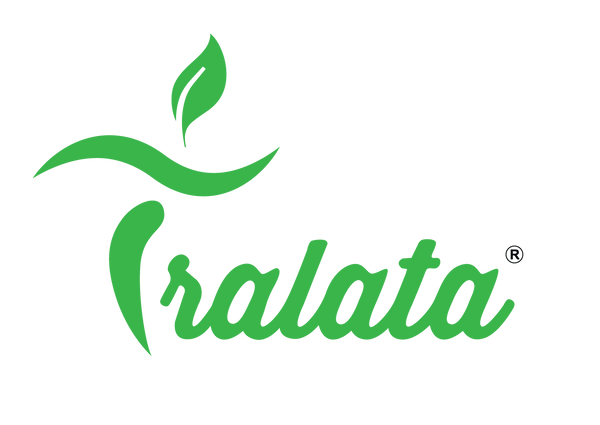
The Power of Nuts & Seeds: A Nutrient-Dense Addition to Your Diet
Share
When it comes to superfoods for health and wellness, nuts and seeds are often at the top of the list. They are small but packed with plant-based protein, healthy fats, antioxidants, vitamins, and minerals that support heart health, brain function, skin health, and longevity. It's no surprise that global nutrition guidelines stress the importance of including them in a balanced diet.
A 2017 review published in the American Journal of Clinical Nutrition found that regular nut consumption is linked to a 15 to 30% lower risk of cardiovascular disease. Similarly, the Canadian Food Guide (2019) shifted focus from processed foods to plant-based proteins, recommending nuts and seeds for improved health outcomes.
Let’s explore the nutritional benefits of nuts and seeds, their uses in plant-based diets, and some important considerations.

Nutritional Profile of Common Nuts & Seeds
1. Almonds
Key nutrients: Vitamin E, magnesium, calcium, antioxidants.
Health benefits: May lower bad cholesterol (LDL), improve skin health, and support weight management.
Nutrition fact: A handful of almonds (28 g) provides 6 g protein and 3.5 g fiber.
2. Walnuts
Key nutrients: Omega-3 fatty acids, manganese, copper.
Health benefits: Linked to better brain health, reduced inflammation, and a lower risk of diabetes (Harvard Study, 2019).
3. Cashews
Key nutrients: Iron, zinc, healthy fats.
Health benefits: Support immune function, energy metabolism, and bone strength.
4. Pistachios
Key nutrients: Vitamin B6, potassium, lutein antioxidants.
Health benefits: Improve gut health by enhancing microbiome diversity (British Journal of Nutrition, 2020).
5. Chia Seeds
Key nutrients: Omega-3s, calcium, soluble fiber.
Health benefits: Support digestive health, blood sugar regulation, and hydration.
6. Pumpkin Seeds
Key nutrients: Zinc, magnesium, antioxidants.
Health benefits: Help improve sleep, support prostate health, and boost immunity.
7. Sesame Seeds
Key nutrients: Calcium, copper, lignans.
Health benefits: Promote bone strength and reduce chronic inflammation.
8. Watermelon Seeds
Key nutrients: Iron, folate, magnesium.
Health benefits: Improve cardiovascular health and provide plant-based protein.
Applications of Nuts & Seeds in Healthy Diets
Nuts and seeds are versatile superfoods widely used in vegan diets, plant-based eating, and clean lifestyles:
Nut Milks: Almond, cashew, and walnut milks are popular dairy alternatives.
Nut Butters: Peanut, almond, and cashew butters are rich in protein and healthy fats.
Plant-Based Cheeses: Cashews and almonds create creamy vegan cheese alternatives.
Healthy Snacks: Roasted nuts, seed mixes, and high-protein trail mixes.
Baking & Cooking: Chia seeds and flax seeds are popular egg substitutes in vegan recipes.
This makes them essential superfoods in vegan, vegetarian, and Mediterranean diets.
Potential Downsides of Nuts & Seeds
While they are nutrient-rich, moderation is important:
Digestive issues: Overeating can cause bloating because of their high fat content.
Calorie-dense: It's easy to overconsume, leading to excess calorie intake.
Nut allergies: Common in both adults and children.
Anti-nutrients: Raw seeds contain phytic acid, which reduces mineral absorption. Soaking or roasting helps.
Final Thoughts
Nuts and seeds are nutritional powerhouses that support longevity, heart health, skin appearance, and digestive balance. From almonds for protein to chia seeds for fiber, these superfoods are vital for a healthy lifestyle.
The best approach is variety and moderation. Instead of sticking to one nut, rotate between almonds, walnuts, chia seeds, pumpkin seeds, and others to maximize nutrient diversity and benefit your gut microbiome.
As the saying goes, big health benefits come in small packages, and nuts and seeds are the perfect example.



